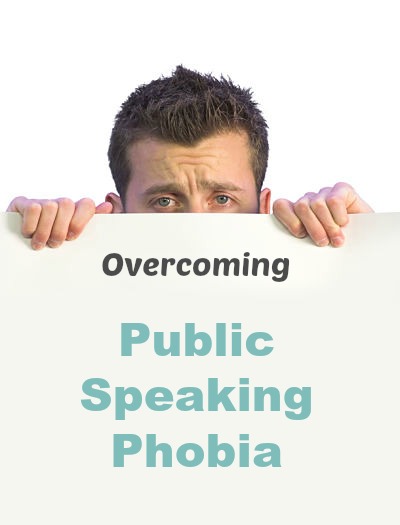Public Speaking Phobia
Public speaking phobia - or glossophobia as it is technically known - is no joke.
For many people, there's nothing more frightening or nerve-wracking than having to speak in public. They would rather bury themselves alive than be asked to give a speech.

According to the Merriam-Webster online dictionary, a phobia is an exaggerated, usually inexplicable and illogical fear of a particular object, class of objects or events.
Therefore a public speaking phobia is a fear of speaking before an audience, also known as stage fright. One way of overcoming stage fright is to understand the origins of the doubt. Let's look at some of the common underlying causes.
Causes of Common Public Speaking Phobias
- An innate need for safety
- A bad public speaking experience
- Unreasonable expectations of oneself
- Making the audience the enemy
- Lacking necessary skill
All people have an innate need for safety
We seek people, places, and situations that give us a sense of wellbeing and protection.
Standing before an audience often arouses a sense of anxiety and insecurity. In other words, public speaking sometimes generates an illogical fear. Our primal instincts for dealing with fearful situations are two: fight or flight.
You can either stay to defend yourself or run fast and far. Both situations induce specific effects in your body - the adrenaline rush, quickened heartbeat, sweating, shallow breathing, stiff muscles, and flushed skin, which prepares you to fight or run a mile.
A bad public speaking experience
It could have happened to you, or you could have observed it happening to somebody else.
That unwelcome memory is so ingrained in your mind that it distorts your perception of public speaking to a thing of dread and fear.
You fear making a fool of yourself, of being judged harshly, of being humiliated, of failing at your speech objectives, and so on. All of these eat away at your confidence level, which is a crucial component for good public speaking.

You might have unreasonable expectations of yourself
Perhaps you've watched elegant speakers and feel that you should be able to communicate precisely to that style and standard.
Public speaking is not about imitating another person, but about nurturing your particular brand of speaking skills. You can learn from the top speakers, but don't try to BE like them.
Be yourself.
You assume the audience is your enemy
This irrational fear stems from assuming that people listening will judge you harshly.
In most cases, the audience wants you to speak well because they too will enjoy listening to you. An exception would be when discussing an unfavorable topic or facing an overtly hostile group. But even in such circumstances, there are skills you can learn for speaking under unwelcoming conditions.
Lack of the necessary skills
You may be nervous because you know you are unprepared for the 'limelight.' You may not yet have learned how to control your nerves and build up your confidence. Or you have not yet developed techniques that enhance your speaking abilities.
How to overcome these fears
There are lots of ways to learn to either cope with or master these common fears.
- Subscribe to this website and receive free tips and advice for speaking in public and doing it WELL.
- Enroll in a public speaking course at a local college.
- Hire a speaking coach or work with me.
- Join a public speaking club - see if there is a Toastmasters group near you.
Gaining the confidence needed to deliver a speech will require time and effort on your part. But like all things you value, you must be willing to work towards speaking success.
Gradually expose yourself to speaking in public: If your anxiety is severe, it may be helpful to start with more minor, less intimidating speaking situations and gradually work up to larger ones.
Strategies for Students to Overcome Glossophobia
Here are a few strategies that may help a student overcome glossophobia:
- Prepare thoroughly: Make sure to plan what you want to say and practice your speech beforehand. This can help reduce anxiety by giving you control and confidence in your ability to deliver the content.
- Use relaxation techniques: Practicing relaxation techniques such as deep breathing, or progressive muscle relaxation can help reduce physical symptoms of anxiety.
- Use positive visualization: Imagine yourself giving a successful speech can help boost your confidence and reduce anxiety.
- Practice public speaking: The more you practice speaking in public, the more comfortable you will become. Consider joining a club or organization where you can speak in front of others.
- Seek support: It can be helpful to talk to someone about your anxiety, whether a friend, family member or therapist. They can provide you with encouragement and support as you work to overcome your fear of public speaking.
Remember that overcoming glossophobia is a process, and it may take time. Don't be too hard on yourself, and try to focus on your progress.
A public speaking phobia is not a terminal illness from which you cannot recover, even though you may feel it is! It's just a temporary, illogical state of mind that you can quickly fix, allowing you to enjoy speaking to an audience and giving you confidence that will open new doors.



